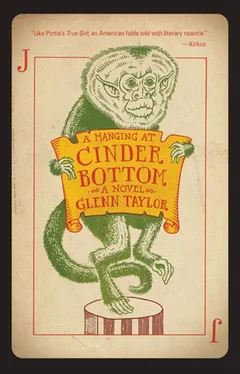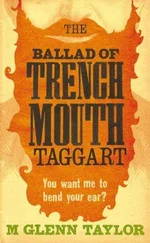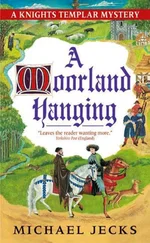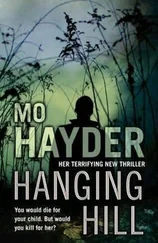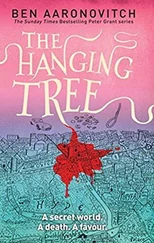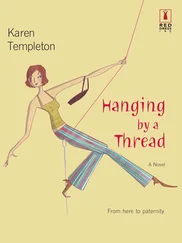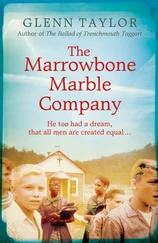Rutherford had so long been around liars and cheats and the tellers of other men’s secrets that he was amply skilled in the art of lip-reading. He tried once more to listen to the man he knew as Tony Sharpley. “Yeah,” he said, looking at the business card. “July the fourth is splendid.” It was a word he’d never before used. Splendid . It sounded funny coming from his mouth. He looked up from the card to find Goldie Toothman between himself and Tony, her cleavage now at his shoulder.
“Rutherford,” she said. “I’ve been meaning to apologize for my behavior at Fred Reed’s place a month ago.” Now she brushed against him, and she made her eyes heavy too. “I drove you to act the way you did by starting trouble myself. I’m working on my language now.”
“That’s good,” Rutherford managed. “Vulgar tongue don’t belong in no woman’s mouth.”
“You’re not so bad Rutherford,” she said, and she leaned in and kissed him on the cheek and walked away.
Munchy stood by the stage and watched. He followed her. He figured if she’d plant one on the smallest man in town, she might plant one on the biggest too.
Rutherford just sat on his stool and looked at the business card in his hand. He was too stunned to watch Goldie go.
They were playing it just as she and Abe had envisioned and written on paper and spoken in whisper and with volume both — they were playing it like they’d practiced.
And, as was their custom, all were playing it as if Abe was seated at the Ashwood Wobbler. He wasn’t.
He was clear up the hill.

Inside his mother’s empty boardinghouse, he sat in a chair at the head of the long kitchen table, conversing in a pleasant manner with Mr. Ladd the God-fearing chaste Virginian, the only boarder to be had.
The young man was explaining, in over-enunciated pronouncements, why it was that the anti-saloon league would sweep away every sinner in every town like Keystone.
“Isn’t but one Keystone,” Abe said.
“I’ll give you that.” Ladd pushed up his glasses and took a drink of his buttermilk.
Abe took a drink of his own and listened to his stomach squeal. He couldn’t remember when he’d last drunk buttermilk.
Mice scurried in the rooms above them, where Sallie slept with little Ben beside her and Agnes read by candlelight.
Out in the second house, Al Baach put together a peculiar pair of shoes.
Mr. Ladd noted a strange tang to his milk. He coughed. He drank some more.
Through the window, the sun’s impossible remains cast against a moon yet eclipsed, and the two men sat inside a radiant and blood-red room.
Abe took note of the thick white droplets hung up in the man’s pathetic mustache. He wished Ladd would take a swipe with the back of his hand, but it was not to be. As he’d been trained, the young man took up his napkin, made it a tight triangle, and dabbed the remnants carefully away. Abe looked past him then at the big floor clock. The minute hand was stubborn. It stuck and pulsed immobile.
The roar was in his head again.
A heavy-framed map of the United States dropped from the wall, its big glass square cracking in two upon landing. For thirty years, it had hung by a nail next to the pie safe.
Oswald Ladd jumped at the sound. He looked to the split-glass map. “Gracious,” he said. “How does that occur?”
Abe watched him swallow and dab. “You don’t have much of an Adam’s apple, do you Mr. Ladd?” he said.
Ladd released the empty tumbler. He’d been careful not to slice his lip on the rim’s chip. He said, “I beg your pardon?”
“You’ll not be pardoned by me sir.” Abe did the math in his head. Ladd had begun to drink his buttermilk at ten past one. Now it was twenty-three past one. He guessed the little man would be asleep by half past.
In the kitchen, just after midnight, Abe had dropped in a hardy dose of muskroot, valerian, maypop, and opium, ground fine as ash. A Tony Thumbs custom powder, guaranteed reliable.
He looked again to the big clock. A little carved mahogany swallow perched at its peak. Its wings seemed to move, and Abe shut his eyes and said, “Tell me again how people pass the time where you’re from.”
Ladd had begun to sweat at the brow. “They don’t pass it Mr. Baach. They wring from it the blood of Christ.”
“They do, do they?” Abe regarded the other man’s white dinner plate. A fly lighted upon the hinge of a chicken bone. “And how does everybody get by without whiskey or beer?”
“I don’t comprehend your question’s meaning.”
Abe sighed. For him, one of life’s most tiresome realities was a conversationalist with no sense of honesty. He moved on. “You say you believe a business with a no-negro policy is better?”
“I believe it is what I am accustomed to.”
“And you don’t want me to teach you any cards?” He produced a deck from nowhere and fanned them next to his plate.
Ladd smiled. His blood was beginning to run hot with that ole good-time muskroot-valerian-maypop-opium-buttermilk punch. “I once played setback,” he said.
“You did, did you?”
Ladd nodded. Loose as a goose.
“And tell me one more time why you picked this house to board in.”
“I’d heard tell of your brother’s vision.” His speech had ceased its enunciation. He thought. “Too, this house needed God’s touch more than most.”
Abe said, “I’ll give you that.”
Ladd’s head sagged. His mouth was open.
Abe left the cards alone and looked at him straight. “I do have a question for you about the birth of Jesus Christ,” he said.
Ladd tried to perk. He worked his lips. “Please,” he said.
“In particular, I’d like to know something about the three kings.”
Ladd nodded, drawn despite his drowsy state toward conversion of the wicked.
“How is it,” Abe went on, “that those three kings arrived there?” He pointed a finger. “How did they come to be right there under your dinner plate?”
And Ladd drooled on his chicken bones and lifted his plate and saw there, underneath, perfectly aligned, the king of spades, the king of clubs, and the king of diamonds. He laughed through his nose before he dropped the plate back and let his head roll the way of his eyes, toward a fireworks borealis in the blackest night his skull had ever known.
Abe watched Ladd lean slow and then capitulate all the way to the floor with a dead man’s thud.
The room key was in the first pants pocket he checked.
He stacked the dishes in the sink before he collected the limp little man and climbed the stairs, toting him to his room like a father carries a child, Ladd’s neck against one forearm, his kneebacks against the other.
Abe was able to unlock the door without setting him down.
He lay him on the made bed.
He struck a kitchen match on his thumb and lit an old lamp. The glass chimney was smutted gray at the mouth. It illuminated the man’s desk, where empty papers had been stacked precise and the capped glass inkwell was half full. The dip pen beside it was gold.
Abe opened a drawer and found another stack of paper, this one marked in Ladd’s fine scrawl. He lifted the dog-eared cumulation of words and set to reading.
Ladd was writing a book.
He’d marked through five titles before he came to the one he wanted:
HISTORY OF KEYSTONE WEST VIRGINIA
OR THE
SODOM AND GOMORRAH OF TODAY
Abe laughed. He turned over the first and read the second, a page of notes.
Trent is present Mayor. Also owner of Alhambra and a timber outfit and mine and is financially interested in several enterprises.
Rutherford chief of police. Often beastly drunk, as are most.
Читать дальше
Конец ознакомительного отрывка
Купить книгу
